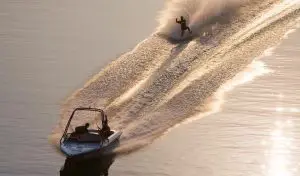Boat camping is a great way to get away from it all. For one thing, boats can take us places that no other form of transportation can. These peaceful places offer quiet and serene anchorages that lie far away from the troubles of land-life.
But staying on your boat presents some challenges. Small vessels seldom have everything you need for extended stays on the water. One area that is nearly always lacking is in the galley.
If your boat doesn’t even have a galley, don’t fret. With some planning and creative thinking, you can eat pretty well on any size boat.
Cooking Without a Galley
With a few simple items, you can survive and cook hot meals on any vessel. Sure, big cruisers come complete with four-burner ranges, ovens, freshwater systems, refrigerators, and freezers. But most small trailerable boats don’t have any of these things. When looking at taking a small boat on a long trip, think creatively. It pays to consider the solutions used by campers and ultra-light backpackers. These folks have figured out how to feed themselves with the least amount of equipment and hassle.
While looking at various solutions, keep in mind your space constraints. While you certainly have more room for bulk and weight than backpackers do, you’re still on a small boat. And chances are you have other gear you’ll want to take like clothes, fishing gear, snorkeling gear, and your regular compliment of boating items. So while you do have space, you don’t have that much to spare.
Your make-shift galley can be as elaborate as you like. If you plan on capitalizing on dock-and-dine restaurants along the way, you might be able to get by with just a coffee maker, cold sandwiches, soups, and light snacks. If you’re a fisherman, you can grill up your catch right there. But don’t limit yourself. If you plan out the sort of meals you want to have on your trip, chances are there’s a way for you to cook it on board.
The primary concerns for cooking onboard are going to be having the ability to heat things on a stove, having fresh water available, and keeping food cold. The better you can do these three things, the better off your cooking situation will be.
Heating Food
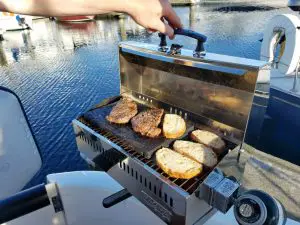
By far, one of the most versatile items you can cook with on a small boat is a grill. Magma makes a propane marine grill that allows you to remove the grate and use the burner alone as a stove.
For the boat camper, this solves all of your cooking problems. You can grill fresh fish or meats and veggies you’ve brought with you, and you can boil water for your coffee.
Marine kettle grills are small enough to fit on any boat and can be mounted with a wide variety of mounts. You can secure them in gunnel fishing rod holders, on rails, or directly to the deck. Yes, they’re expensive, but if cared for and cleaned, they will last for years.
There are many other grill options on the market. You can use a propane or charcoal grill that is designed for tailgating. Just make sure that you have an open and stable spot where you can set it up that is away from combustibles on your boat, like the fuel tank. Make sure that it’s absolutely secure and that there is no risk of it heating the fiberglass. It cannot be overstated; nothing burns faster or better than fiberglass! Safety first.
Another great advantage of having a portable grill onboard is being able to take it off the boat to the beach. If you’ve pulled up on your favorite remote island, why not have a beach barbecue? You can cook over a bonfire, roast clams in the sand, or just set up your boat grill on terra firma. Many marine grills have fold-down legs for cooking land or dockside.
Another option to heating a kettle or a cooking pan is a camping stove. These come in a wide variety of shapes and sizes and are usually powered with propane or butane. These will boil water faster and easier than a grill alone and are perfect for your morning cup of joe. Try to find the flat models that won’t tip over on the boat instead of the vertical designs that mount on top of a one-pound propane bottle.
Fresh Water
You’ve probably already considered the need for freshwater on your trip. After all, you need to drink, right? But on an extended trip, you’ll want to have more water than just drinking water. You’ll also want to brush your teeth, wash up, and do dishes.
Even some small boats have a water system, maybe with a small bladder tank and a manual pump. If your boat doesn’t carry enough water, consider getting one or two jerry cans for freshwater. The advantage of these sturdy plastic containers is that they can be strapped to pretty much any part of your boat, even on the side rail where they’ll be out of the way.
Flexible bladder tanks are another option. They collapse and roll up when empty and not in use, which saves you storage space. But when they are full, it’s a challenge to get the water out of them. They’re best suited if you have some sort of manual pump.
Another option is to use the five-gallon water jugs that can be refilled at any supermarket. You can purchase an inexpensive manual hand pump that fits on top of the jug. You can then refill your jugs with clean water nearly anywhere and keep the one in use handy. This is a great option since those five-gallon jugs are super hardy, and your water will be of excellent quality. You can easily refill reusable water bottles and reduce your trash-output at the same time.
Keeping Your Food and Drinks Cold
Most boaters keep a cooler on board, and they know they can get ice at pretty much any dock. Many marinas even offer free ice with a fill-up. But if you’re going off for an extended trip, you might want to invest in the best cooler you can find.
Premium coolers are all the rage in the fishing world right now. Beefy models like the now ubiquitous Yeti cooler seem to be everywhere. If you’re not up for spending that much cash on a cooler, check out the top-of-the-line models made by Igloo and Coleman. Every brand makes a premium cooler that keeps ice for five days or more. The extra cost of a really good cooler is worth it on a trip like this.
Another option to keep your cooler cold longer is to use bock ice. Block ice is still sold at some marinas, but it seems to get less and less popular every year. There once was a time when refrigeration of any sort was rare on boats, and block ice could be left in the icebox for many, many days before you needed to buy some more. It works great, lasts longer, and you can still chip off some for your evening sundowners.
If you want to go all out and live the high life, consider a 12-volt cooler-style refrigerator. Engle and Dometic both make models that are extremely energy efficient. Regardless, if you go this route, you’ll need to make sure that your boat’s electrical system is up to the task. Make sure your batteries have enough reserve capacity to run the fridge for a day or two.
You’ll want to have a domestic, or house, battery onboard to ensure your starting battery doesn’t get drained. The nicer fridges have a safety cutoff to prevent them from completely exhausting your batteries, but then your refrigerator stops working, and your food goes bad. So do the math and make sure you have enough amp-hours of battery capacity to keep the fridge on and start your engine the next morning.
5 Tips for Cooking Onboard
1. Keep it Small and Simple
There’s no need to go all out on your boat kitchen. You only need a flat spot on the boat, like the cockpit floor or a portable fillet table, and a few items to cook with. Keep it as simple as possible and think through what you’ll need before you depart.
2. Meal Prep is Key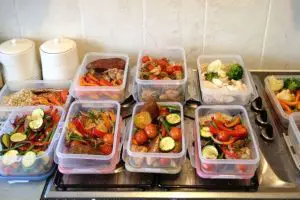
The more cooking prep you can do on land, the better. Plan the recipes you want to make and pre-chop the veggies and meats. If you’re grilling steaks, consider marinating them and portioning them out in individual ziplock bags you can keep in the cooler. Whatever the meal, do what you can do ahead of time so that when you get on the boat, all you have to do is cook and assemble.
3. Research Camp Cooking
Hiking and camping folks have been doing this well for hundreds, or maybe thousands, of years. Take a stroll around your local REI or even the camping aisle at Wal-Mart to see what sorts of camp cooking items could be used on your boat. The advantages are that they will be small and lightweight, and they probably won’t need electricity. These are all perfect for boat life.
When it comes to the actual food, this does not mean that you need to live off of nasty dehydrated food and granola. But some pre-made reheat-and-eat meals are delicious and require zero effort. Check out Tasty Bite-brand Indian curries for a special treat.
4. Use Ocean-Safe Soaps
On a boat, all drains lead to the ocean. If you’re going to be doing dishes and bathing on board, use ocean-friendly soaps. Most commercial dish liquids, body soaps, and shampoos have petroleum distillates and other nasty chemicals. Look for soaps labeled with all-natural ingredients or specially ocean-safe. If you travel in freshwater, this is doubly important.
Keep this in mind when cleaning your boat as well. Never use bleach when it can drain into the water. Instead, keep a bottle of white vinegar on board to clean up spills and surfaces. It disinfects and is environmentally friendly.
5. Don’t Miss the Must-Have Items
Don’t forget to pack a bag with all of your kitchen staples. A good chef’s knife and cutting board, some silverware, a pot for boiling water, and a pan for cooking food are a good start. Make a spice kit with your favorite mixes, salt and pepper, and olive oil. And remember you’ll need a scrubby and dish soap to clean up. If you’re a coffee drinker, look into getting an old-school percolator or an Aeropress coffee maker. Both easily make great coffee with minimal fuss.
Conclusion
Cooking onboard should be part of the fun and part of the adventure. How much of it you do is up to you, be it just making coffee in the morning or making a gourmet-style meal. Everyone will enjoy a break for the occasional dock and dine, but you also want the option to stay aboard at anchor, enjoying a quiet evening on the water under the stars.

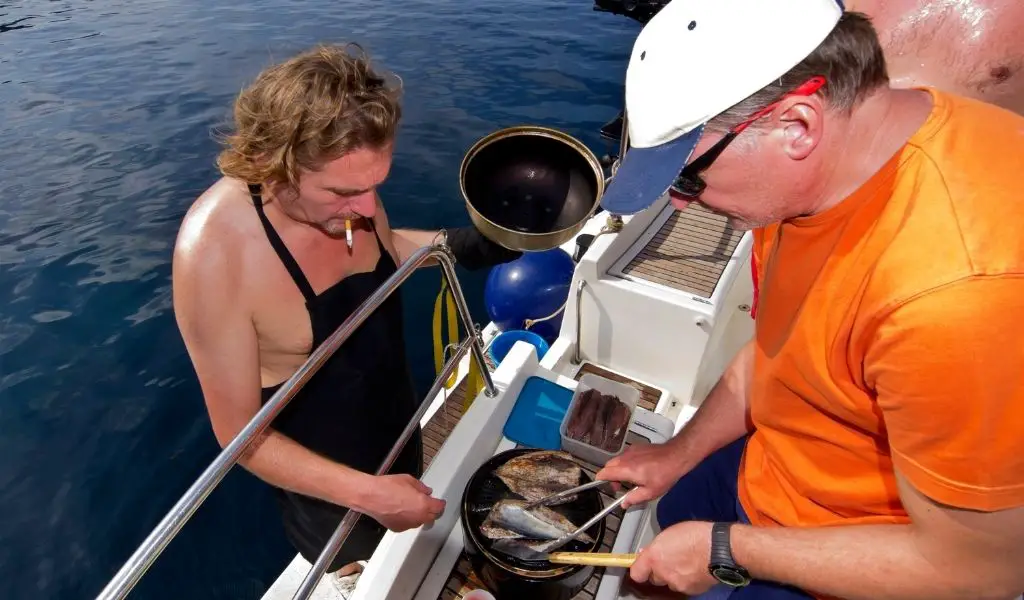
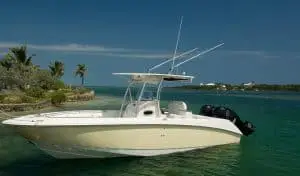
![Read more about the article Best Manual Trim Tabs for Boats [Buyers Guide]](https://towers4boats.com/wp-content/uploads/2020/10/Best-Manual-Trim-Tabs-for-Boats-300x176.jpg)
